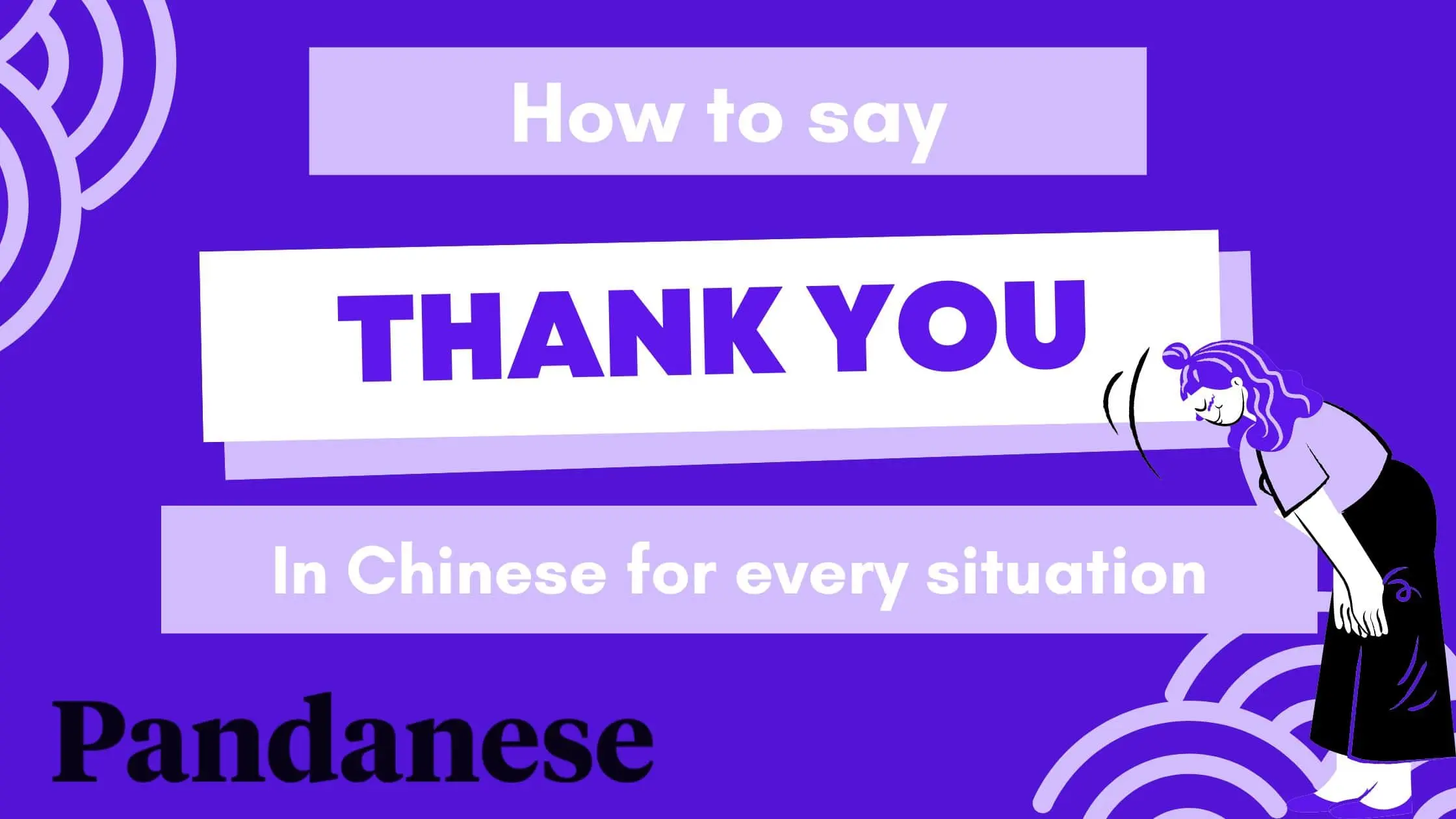
How to Say Thank You In Mandarin In Any Situation
“Thank you” is one of the most important phrases you’ll learn in Mandarin; it is essential to your Chinese language learning journey. In everyday life, saying “thank you” is just as important as saying “Hello.” It is a way to show courtesy and respect for Chinese people.
Gratitude is a universal language, especially in Chinese culture, where their heritage is ingrained in appreciation, humility, respect, and honor. That is why knowing the different fundamental forms of expressing gratitude in Chinese for every situation is imperative. So you can say thank you in every way!
How to say thank you in Chinese

How to say “Thank you” in Chinese
Common ways to say thank you in Chinese
Pinyin |
Hanzi |
English |
Meaning |
When to use: |
Xièxiè |
谢谢 |
Thank you. |
This is the most common phrase to say thank you in Mandarin. It is a basic but effective remark to show appreciation to anyone. |
It is safe to say Xièxiè whenever you want to express your gratitude in Chinese in most social situations. |
Xiè le |
谢了 |
Thanks! |
This is a quick and informal way to give thanks in Chinese. |
You can use Xiè le when saying thank you to friends, family, or colleagues. It is also a popular expression for text messaging where it calls for short words and phrases. |
Duō xiè |
多谢 |
Many thanks! |
This phrase shows great appreciation in Chinese in a casual way. |
This can be used for informal conversations or through text. |
Duōxièle! |
多谢了! |
Thanks a lot |
This phrase shows great appreciation in Chinese in a casual way with more enthusiasm. |
This can be used when you want to show gratitude to a friend who helped you out. Do not use it for elders or your boss. |
Gǎnxiè nǐ wèi wǒ zuò de yīqiè |
感谢你为我做的一切. |
Thank you for Everything |
This is a phrase that shows great gratitude to someone. |
A good example is saying “thank you for everything” to your parents to show thanks for all the things they’ve done for you. |
Beginner to Advance: 10 Ways to Say Thank You in Chinese
How to say thank you in Chinese to someone nice to you:
When someone helped you:
Pinyin |
Hanzi |
English |
Meaning |
When to use: |
Xièxiè nǐ de bāngzhù. |
谢谢你的帮助. |
Thank you for your help. |
This phrase gives thanks for the help you received. |
When someone helps you with something. |
Nín zhēnshì tài hǎo le |
您真是太好了 |
That’s very kind of you. |
This shows that you are grateful to them and give them recognition for their kind act. You can say Nín zhēnshì tài hǎo le to someone who gives you presents. |
You can use this phrase when someone goes out of their way to help you, offer you kindness, or give you a great service. |
tài xiè xiè nǐ le, nǐ duì wǒ zhēn hǎo! |
太谢谢你了,你对我真好! |
Thank you so much! You’re so good to me! |
When you want to acknowledge the good deeds done to you. |
Use this when you want to show appreciation of their kind action towards you. |
fēi cháng gǎn xiè nǐ a!jīn tiān nǐ bāng le wǒ yī gè máng. |
非常感谢你啊!今天你帮了我一个忙. |
Thank you very much! You did me a favor today. |
This phrase shows appreciation of the favor extended towards you. |
You can use this phrase when someone gives you some help. |
When someone gave you a compliment:
Pinyin |
Hanzi |
English |
Meaning |
When to use: |
Gǎnxiè nín de zànměi zhī cí |
感谢您的赞美之辞 |
Thank you for your kind words. |
This phrase is used when someone pays you a compliment, cheers you up, or says something nice to you |
You can say Gǎnxiè nín de zànměi zhī cí when someone shows you kindness. |
When you want to repay their kindness:
Pinyin |
Hanzi |
English |
Meaning |
When to use: |
gǎi tiān qǐng nín chī fàn! |
改天请您吃饭! |
I’ll treat you to a meal someday! |
Action speaks louder than words. This is a great way to show appreciation by giving back to someone who showed you kindness. |
You can use this phrase when someone pays for a meal, and you’d like to express your appreciation and gratitude towards them, as well as your willingness to give something in return. |
When someone tells you something/ gives you information:
Pinyin |
Hanzi |
English |
Meaning |
When to use: |
Xièxiè nǐ ràng wǒ zhī dào. |
谢谢你让我知道 |
Thank you for letting me know. |
This phrase is used when someone gives you information or tells you something important. |
You can say Gǎnxiè nín de zànměi zhī cí when someone praises you. |
How to say thank you in Chinese when you’re in a gathering, party, or occasion.
When you want to say thank you to everyone in the event:
Pinyin |
Hanzi |
English |
Meaning |
When to use: |
Xiè xiè dá jiā |
谢谢大家 |
Thank you all. |
This phrase is commonly used when speaking to a crowd or audience |
You can use this phrase to say Thank you in Chinese after giving a presentation or speech in a gathering. |
When you want to say thank you to those who attended your event:
Pinyin |
Hanzi |
English |
Meaning |
When to use: |
Gǎnxiè nín jīntiān de guānglín. |
感谢您今天的光临 |
Thank you for coming today. |
This phrase is used when you appreciate someone’s presence or attending your event. |
This phrase is essential when you’re doing business meetings, hosting a party, or giving welcome and to start an event. |
Xièxiè nín huā shíjiān hé wǒmen zài yìqǐ. |
谢谢您花时间和我们在一起 |
Thank you for spending time with us. |
This phrase is used when you’re concluding your thanks to someone who attended your event. |
This is a great phrase to close a meeting or as a farewell to guests of your party. |
When someone brings you a gift:
Pinyin |
Hanzi |
English |
Meaning |
When to use: |
Xièxie nǐ de lǐwù. |
谢谢你的礼物. |
Thank you for the gift. |
Show your gratitude for an item or gift you received. |
This is a good phrase to remember when you receive a gift from someone. |
Xièxiè nǐ de _____! |
谢谢你的 _____! |
Thank you for the (item)! |
Acknowledging the gift you received and giving thanks. |
This is a good phrase when you want to acknowledge the item you received. Example: Xièxiè nǐ de kā fēi (coffee)! |
How to say thank you in Chinese to a mentor, boss, elder, or someone who guided you.
When someone taught you or guided you:
Pinyin |
Hanzi |
English |
Meaning |
When to use: |
Wǒ fēicháng gǎnxiè nǐ. |
我非常感谢你. |
I have learned so much thanks to you. |
It means that they have succeeded in helping you achieve something, and you’re thankful for that. |
This is a lovely compliment to give your teacher or a friend who helps you learn something or prepare for a test. |
Gǎnxiè nín de nàixīn bìng bāngzhù wǒ tígāo. |
感谢您的耐心并帮助我提高. |
Thank you for being patient and helping me improve. |
It shows appreciation for the patience and help you received. |
This is a good phrase to use if you want to thank your Chinese teacher, trainer, employer, or colleague. This phrase can also be used in any formal or informal situation. |
When someone considered you:
Pinyin |
Hanzi |
English |
Meaning |
When to use: |
Xièxiè nín de guānxīn. |
谢谢您的关心. |
Thank you for your consideration. |
This is a formal, even almost solemn, way to thank someone for their thoughtfulness and sensitivity towards you. You’d like to thank them, in essence, for the time and effort they are about to or have spent on your submission. |
It is also suitable to use when a Chinese person has to consider something you submit, such as a job application, a project, or a proposal. |
Bonus: How to say you’re welcome in Chinese:

How to say “You’re welcome” in Chinese
Here’s a guide on how to respond when someone thanks you in Mandarin.
Pinyin |
Hanzi |
English |
Meaning |
When to use: |
Bù kèqì |
不客气 |
You’re welcome! |
This is the most used expression. It can fit nearly every situation. |
When someone thanks you. |
Bú yòng xiè |
不用谢 |
Don’t mention it. |
A casual way of saying “you’re welcome” |
When someone thanked you for doing them a favor |
Xiǎo shì yī zhuāng |
小事一桩 |
It’s nothing. |
You should be careful when using this phrase as it tends to be more informal. |
You can use it with your friends or family members, but certainly not your boss! |
Bù |
不 |
No |
It’s a modest and polite reply to praise in Mandarin. |
Sometimes the Chinese will use some negation words like 不 (bù) 没 (méi) to refuse your praise. It doesn’t mean that they don’t like or agree with what you said. |
Méi guānxi |
没关系 |
No problem |
Another casual way of saying “you’re welcome” |
Use it in informal speech or text. |
22 Ways to Say You’re Welcome in Chinese | No Problem in Chinese
Frequently asked questions:
Do Chinese say thank you?
Yes, Chinese usually say Xièxiè to give thanks or its other variations in Mandarin. Read our blog to find out how to say thank you in Chinese for every situation.
Is Xie Xie polite?
Yes, Xièxiè is an acceptable phrase to say thank you in every situation as it is a common phrase. If you want to sound more polite, you can say Gǎnxiè nǐ wèi wǒ zuò de yīqiè to say “Thank you for everything” or read our blog to find out how to say thank you in Chinese in all kinds of situations.
What is Xie Xie in English?
Xièxiè is the Mandarin way to say Thank you in Chinese. It shows gratitude and thankfulness.
How do you say thank you to a friend in Chinese?
Duō xiè means “many thanks” in Mandarin. It is a casual way to express gratitude to a friend.
The bottom line
There are numerous ways to express gratitude and thankfulness in Chinese. Saying thank you not only shows your politeness but also helps you become familiar with Chinese customs and traditions. Once you master these expressions, you can speak confidently like a native speaker.
Familiarize yourself with more Chinese phrases and learn Hanzi with Pandanese online or with the Pandanese App. Alongside providing users with Chinese radicals, characters, and vocabulary flashcards, Pandanese teaches you about Chinese culture and general etiquette. Our handcrafted curriculum supports users with three main learning purposes: school, business, or travel.
The easiest way to learn Chinese & build vocabulary

